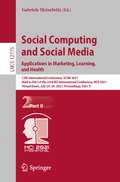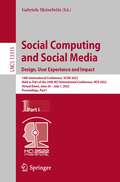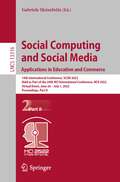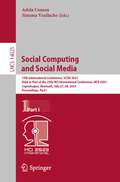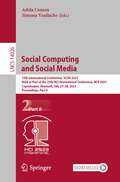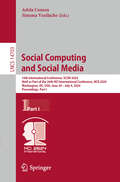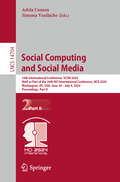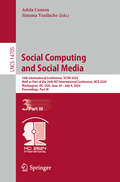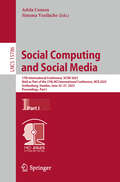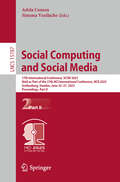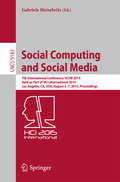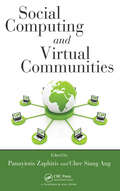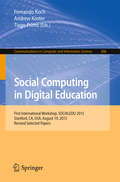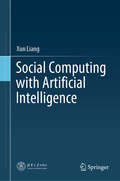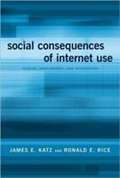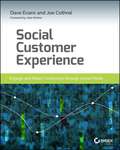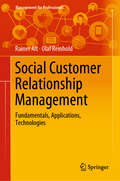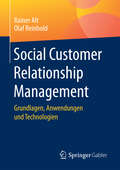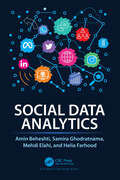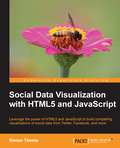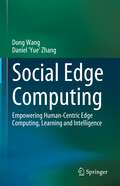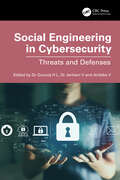- Table View
- List View
Social Computing and Social Media: 13th International Conference, SCSM 2021, Held as Part of the 23rd HCI International Conference, HCII 2021, Virtual Event, July 24–29, 2021, Proceedings, Part I (Lecture Notes in Computer Science #12774)
by Gabriele MeiselwitzThis two-volume set LNCS 12774 and 12775 constitutes the refereed proceedings of the 12th International Conference on Social Computing and Social Media, SCSM 2021, held as part of the 23rd International Conference, HCI International 2021, which took place in July 2021. Due to COVID-19 pandemic the conference was held virtually. The total of 1276 papers and 241 poster papers included in the 39 HCII 2021 proceedings volumes was carefully reviewed and selected from 5222 submissions. The regular papers of SCSM 2021, Part I, are organized in topical sections named: Computer Mediated Communication; Social Network Analysis; Experience Design in Social Computing.
Social Computing and Social Media: 13th International Conference, SCSM 2021, Held as Part of the 23rd HCI International Conference, HCII 2021, Virtual Event, July 24–29, 2021, Proceedings, Part II (Lecture Notes in Computer Science #12775)
by Gabriele MeiselwitzThis two-volume set LNCS 12774 and 12775 constitutes the refereed proceedings of the 12th International Conference on Social Computing and Social Media, SCSM 2021, held as part of the 23rd International Conference, HCI International 2021, which took place in July 2021. Due to COVID-19 pandemic the conference was held virtually. The total of 1276 papers and 241 poster papers included in the 39 HCII 2021 proceedings volumes was carefully reviewed and selected from 5222 submissionsThe regular papers of SCSM 2021, Part II, are organized in topical sections named: SCSM in Marketing and Customer Behavior; Social Computing in Learning and Education; SCSM in Health and Wellbeing.
Social Computing and Social Media: 14th International Conference, SCSM 2022, Held as Part of the 24th HCI International Conference, HCII 2022, Virtual Event, June 26 – July 1, 2022, Proceedings, Part I (Lecture Notes in Computer Science #13315)
by Gabriele MeiselwitzThis two-volume set LNCS 13315 and 13316 constitutes the refereed proceedings of the 14th International Conference on Social Computing and Social Media, SCSM 2022, held as part of the 24rd International Conference, HCI International 2022, which took place in June-July 2022. Due to COVID-19 pandemic the conference was held virtually.The total of 1276 papers and 275 posters included in the 40 HCII 2022 proceedings volumes was carefully reviewed and selected from 5583 submissions. The papers of SCSM 2022, Part I, are organized in topical sections named: design and user experience in social media and social live streaming; text analysis and AI in social media; social media impact on society and business.
Social Computing and Social Media: 14th International Conference, SCSM 2022, Held as Part of the 24th HCI International Conference, HCII 2022, Virtual Event, June 26 – July 1, 2022, Proceedings, Part II (Lecture Notes in Computer Science #13316)
by Gabriele MeiselwitzThis two-volume set LNCS 13315 and 13316 constitutes the refereed proceedings of the 14th International Conference on Social Computing and Social Media, SCSM 2022, held as part of the 24rd International Conference, HCI International 2022, which took place in June-July 2022. Due to COVID-19 pandemic the conference was held virtually.The total of 1276 papers and 275 posters included in the 40 HCII 2022 proceedings volumes was carefully reviewed and selected from 5583 submissions. The papers of SCSM 2022, Part II, are organized in topical sections named: social media in education; customer experience and consumer behavior.
Social Computing and Social Media: 15th International Conference, SCSM 2023, Held as Part of the 25th HCI International Conference, HCII 2023, Copenhagen, Denmark, July 23–28, 2023, Proceedings, Part I (Lecture Notes in Computer Science #14025)
by Adela Coman Simona VasilacheThis two-volume set LNCS 14025 and 14026 constitutes the refereed proceedings of the 15th International Conference on Social Computing and Social Media, SCSM 2023, held as part of the 25th International Conference, HCI International 2023, held in Copenhagen, Denmark in July 2023.The total of 1578 papers and 396 posters included in the HCII 2023 proceedings was carefully reviewed and selected from 7472 submissions. The SCSM 2023 conference offers a wide range of topics related to the design, development, assessment, use, and impact of social media.
Social Computing and Social Media: 15th International Conference, SCSM 2023, Held as Part of the 25th HCI International Conference, HCII 2023, Copenhagen, Denmark, July 23–28, 2023, Proceedings, Part II (Lecture Notes in Computer Science #14026)
by Adela Coman Simona VasilacheThis two-volume set LNCS 14025 and 14026 constitutes the refereed proceedings of the 15th International Conference on Social Computing and Social Media, SCSM 2023, held as part of the 25th International Conference, HCI International 2023, held in Copenhagen, Denmark in July 2023.The total of 1578 papers and 396 posters included in the HCII 2023 proceedings was carefully reviewed and selected from 7472 submissions. The SCSM 2023 conference offers a wide range of topics related to the design, development, assessment, use, and impact of social media.
Social Computing and Social Media: 16th International Conference, SCSM 2024, Held as Part of the 26th HCI International Conference, HCII 2024, Washington, DC, USA, June 29–July 4, 2024, Proceedings, Part I (Lecture Notes in Computer Science #14703)
by Adela Coman Simona VasilacheThis book constitutes the refereed proceedings of the 16th International Conference on Social Computing and Social Media, SCSM 2024, held as part of the 26th HCI International Conference, HCII 2024, which took place in Washington, DC, USA, during June 29–July 4, 2024. The total of 1271 papers and 309 posters included in the HCII 2024 proceedings was carefully reviewed and selected from 5108 submissions. The SCSM 2024 proceedings were organized in the following topical sections: Part I: Designing, developing and evaluating social media; user experience and user behavior in social media; AI and language models in social media; Part II: Social media in learning, education and culture; social media in business and ecommerce; Part III: Computer-mediated communication; social media for community, society and democracy.
Social Computing and Social Media: 16th International Conference, SCSM 2024, Held as Part of the 26th HCI International Conference, HCII 2024, Washington, DC, USA, June 29–July 4, 2024, Proceedings, Part II (Lecture Notes in Computer Science #14704)
by Adela Coman Simona VasilacheThis book constitutes the refereed proceedings of the 16th International Conference on Social Computing and Social Media, SCSM 2024, held as part of the 26th HCI International Conference, HCII 2024, which took place in Washington, DC, USA, during June 29–July 4, 2024. The total of 1271 papers and 309 posters included in the HCII 2024 proceedings was carefully reviewed and selected from 5108 submissions. The SCSM 2024 proceedings were organized in the following topical sections: Part I: Designing, developing and evaluating social media; user experience and user behavior in social media; AI and language models in social media; Part II: Social media in learning, education and culture; social media in business and ecommerce; Part III: Computer-mediated communication; social media for community, society and democracy.
Social Computing and Social Media: 16th International Conference, SCSM 2024, Held as Part of the 26th HCI International Conference, HCII 2024, Washington, DC, USA, June 29–July 4, 2024, Proceedings, Part III (Lecture Notes in Computer Science #14705)
by Adela Coman Simona VasilacheThis book constitutes the refereed proceedings of the 16th International Conference on Social Computing and Social Media, SCSM 2024, held as part of the 26th HCI International Conference, HCII 2024, which took place in Washington, DC, USA, during June 29–July 4, 2024. The total of 1271 papers and 309 posters included in the HCII 2024 proceedings was carefully reviewed and selected from 5108 submissions. The SCSM 2024 proceedings were organized in the following topical sections: Part I: Designing, developing and evaluating social media; user experience and user behavior in social media; AI and language models in social media; Part II: Social media in learning, education and culture; social media in business and ecommerce; Part III: Computer-mediated communication; social media for community, society and democracy.
Social Computing and Social Media: 17th International Conference, SCSM 2025, Held as Part of the 27th HCI International Conference, HCII 2025, Gothenburg, Sweden, June 22–27, 2025, Proceedings, Part I (Lecture Notes in Computer Science #15786)
by Adela Coman Simona VasilacheThis book constitutes the refereed proceedings of the 17th International Conference on Social Computing and Social Media, SCSM 2025, held as part of the 27th HCI International Conference, HCII 2025, which took place in Gothenburg, Sweden, during June 22–27, 2025. A total of 1430 papers and 355 posters included in the HCII 2025 proceedings was carefully reviewed and selected from 7972 submissions. The SCSM 2025 proceedings were organized in the following topical sections- Designing and Developing Social Interactions, Social Media in Learning and Education, Supporting Communication and Psychological Well-Being, User Behavior and Experience in Social Media, and, AI and Social Network Analysis.
Social Computing and Social Media: 17th International Conference, SCSM 2025, Held as Part of the 27th HCI International Conference, HCII 2025, Gothenburg, Sweden, June 22–27, 2025, Proceedings, Part II (Lecture Notes in Computer Science #15787)
by Adela Coman Simona VasilacheThis book constitutes the refereed proceedings of the 17th International Conference on Social Computing and Social Media, SCSM 2025, held as part of the 27th HCI International Conference, HCII 2025, which took place in Gothenburg, Sweden, during June 22–27, 2025. A total of 1430 papers and 355 posters included in the HCII 2025 proceedings was carefully reviewed and selected from 7972 submissions. The SCSM 2025 proceedings were organized in the following topical sections- Designing and Developing Social Interactions, Social Media in Learning and Education, Supporting Communication and Psychological Well-Being, User Behavior and Experience in Social Media, and, AI and Social Network Analysis.
Social Computing and Social Media: 7th International Conference, SCSM 2015, Held as Part of HCI International 2015, Los Angeles, CA, USA, August 2-7, 2015, Proceedings (Lecture Notes in Computer Science #9182)
by Gabriele MeiselwitzThis book constitutes the refereed proceedings of the 7th International Conference on Social Computing and Social Media, SCSM 2015, held as part of the 17th International Conference on Human-Computer Interaction, HCII 2015, held in Los Angeles, CA, USA, in August 2015. The total of 1462 papers and 246 poster papers presented at the HCII 2015 conferences was carefully reviewed and selected from 4843 submissions. These papers address the latest research and development efforts and highlight the human aspects of design and use of computing systems. The papers accepted for presentation thoroughly cover the entire field of human-computer interaction, addressing major advances in knowledge and effective use of computers in a variety of application areas. The 25 contributions included in the SCSM 2015 proceedings were organized in the following topical sections: designing social media; social network analysis; and individual and group behaviour in social media.
Social Computing and Virtual Communities
by Panayiotis Zaphiris Chee Siang AngDue to the advancement of the Internet, online communities are gaining increasing importance in the research community. Presented from a user's perspective, this book explores the diverse application areas of social computing and online communities. A significant portion of the text focuses on real-world case studies in which user behaviors, social mechanisms, and technological issues are investigated. Drawing from computer science, information systems, and social science, the book takes a multidisciplinary approach to evaluate virtual communities. It is useful for those who construct, moderate, and maintain online communities.
Social Computing in Digital Education
by Fernando Koch Andrew Koster Tiago PrimoThis book constitutes the refereed proceedings of the First International Workshop, SOCIALEDU 2015, held in Stanford, CA, USA, in August 2015. The workshop aimed to discuss computational models of social computing applied to Digital Education. The 9 revised full papers presented were carefully reviewed and selected from 12 submissions. The papers address issues such as novel data mining and machine learning for social intelligence in digital education. - Social modelling and simulation to investigate social behaviours, emotional intelligence, influence processes and other social aspects that may influence learning performance in an educational environment. - Smart environments and interactive systems of social computing in digital education. - Analysis of social media and media intelligence in digital education. - Mobile social gaming in digital education. - The utilization of mobile and wearable technology in social systems in digital education, and others.
Social Computing with Artificial Intelligence
by Xun LiangThis book provides a comprehensive introduction to the application of artificial intelligence in social computing, from fundamental data processing to advanced social network computing. To broaden readers’ understanding of the topics addressed, it includes extensive data and a large number of charts and references, covering theories, techniques and applications. It particularly focuses on data collection, data mining, artificial intelligence algorithms in social computing, and several key applications of social computing application, and also discusses network propagation mechanisms and dynamic analysis, which provide useful insights into how information is disseminated in online social networks. This book is intended for readers with a basic knowledge of advanced mathematics and computer science.
Social Consequences of Internet Use: Access, Involvement, and Interaction
by James E. Katz Ronald E. RiceAuthors explore the impact of the Internet on society from three perspectives: access to Internet technology, involvement with groups and communities through the Internet, and use of the Internet for social interaction and expression.
Social Customer Experience
by Dave Evans Joe CothrelSocial Customer Experience: Engage and Retain Customers through Social Media builds on the prior works of author Dave Evans. As an update to Evans's earlier book Social Media Marketing, the new Social Customer Experience connects the early cases presented in 2010 with significant, contemporary examples, key concepts, and best practices associated with the adoption of social technology by global brands. This latest edition offers a blueprint for transforming your organization's disparate social initiatives into a unified social experience strategy. Most people know that social technologies are transforming business, but few understand how those changes are happening across the organization. Whether in marketing, communications, customer care, digital media or product development these changes shape the way in which business manage the experience their customers have with the brand. Filled with practical examples of what to do, and illustrated with cases taken from real companies, Social Customer Experience fills in the gaps for companies who want to do more with social than just listen and experiment.Part I lays the groundwork by explaining the three waves of change that combine to form social customer experience: social technologies and their impact on Web 1.0 digital infrastructures; social customers and their impact on marketing and support operations; and the new discipline of customer experience management that is reframing the old sales-and-service-centric ways of thinking about how companies relate to customers. Part I concludes by defining the social customer experience ecosystem, both on and off your own web domain.Part II, "Your Social Presence," puts you on the ground, with tactics and examples for how to apply social technologies and achieve your business objectives, how to measure and analyze social data and show business value, and how to implement a best-practice approach to avoid common traps and pursue proven opportunities.Part III digs deeper into the five building blocks of social customer experience: organization, platform, content, people and tools. What's a social experience organization look like? What systems need to be in place? How do you get the most out of the social "objects" - content and other assets - that are the byproduct of great social customer experiences? How do connections between customers - the social graph - come into play? And what applications will you use - literally, what will you empower your customers to do? Part III answers these questions in the practical, method-driven style of authors Dave Evans and Joe Cothrel. Social Customer Experience features detailed exercises that show you how to translate learning into action, hands-on tutorials using today's social media tools and platforms, and compelling, modern case studies from organizations of all sizes--from the Fortune 500 to nonprofits and mom-n-pop main-street shops. As a bonus, the book also features resources and references to connect readers with the current thought leaders and sources of timely information.If you're interested in business, and how business is being reshaped by social technology, Social Customer Experience will show you a path to a new relationship with your customers, customers not only buy your products and services but get more out of them and go on to become partners in your business-selling, supporting, and innovating on your behalf.
Social Customer Relationship Management: Fundamentals, Applications, Technologies (Management for Professionals)
by Rainer Alt Olaf ReinholdSocial media has received considerable attention, and many potential benefits, as well as concerns, are now being discussed. This book explores how social media can successfully support business processes in marketing, sales and service in the context of customer relationship management (CRM). It presents the fundamentals of Social CRM and shows how small and large companies alike have implemented it.In turn, the book presents analytic and operational software tools that offer features for enhancing and streamlining interactions with customers. The book concludes with an overview of essential design areas that businesses need to bear in mind when introducing social media into their CRM strategies. In this regard, it also points out key success factors, limitations, and data protection aspects.
Social Customer Relationship Management: Grundlagen, Anwendungen und Technologien
by Rainer Alt Olaf ReinholdDieses Buch zeigt wie die Verbindung von Social Media mit Customer Relationship Management (CRM) Perspektiven für Marketing, Verkauf und Service schafft. Es kombiniert dazu Grundlagenwissen und Fallbeispiele. Für das Social CRM identifizieren die Autoren vier Verwendungszwecke sowie drei Umsetzungsstufen und thematisieren auch Fragen der Datenerschließung und der Datenqualität. Es richtet sich sowohl an Praktiker als auch an Lehrende und Studierende.
Social Cyber Engineering and Advanced Security Algorithms
by Soorena Merat Wahab AlmuhtadiThis book takes readers on a captivating journey through the history of social engineering, tracing its evolution from the mechanical marvels of the clockwork era and the rise of automata to the modern age of artificial intelligence and the looming dawn of quantum computing. It explores how social engineering tactics have adapted alongside technological advancements, exploiting human psychology and vulnerabilities across every era.Social Cyber Engineering and Advanced Security Algorithms delves into the intricate connections between human behavior, evolving technology, and the ever-changing landscape of cybersecurity. It examines how personal and psychological factors can be exploited in cyberattacks, providing real-world examples and case studies to illustrate these vulnerabilities. Beyond highlighting the challenges, the book offers proactive strategies and potential solutions for organizations and policymakers to navigate this complex terrain. It emphasizes the importance of algorithmic resilience in employee categorization and training and explores the transformative potential of quantum computing in bridging mental health and cybersecurity.This book serves as a guide for computer scientists, engineers, and professionals interested in understanding the intricate relationship between human behavior, technology, and security in the digital age. It offers a unique perspective on the past, present, and future of social engineering, providing valuable insights for anyone seeking to build a more secure and resilient digital world.
Social Data Analytics
by Amin Beheshti Samira Ghodratnama Mehdi Elahi Helia FarhoodThis book is an introduction to social data analytics along with its challenges and opportunities in the age of Big Data and Artificial Intelligence. It focuses primarily on concepts, techniques and methods for organizing, curating, processing, analyzing, and visualizing big social data: from text to image and video analytics. It provides novel techniques in storytelling with social data to facilitate the knowledge and fact discovery. The book covers a large body of knowledge that will help practitioners and researchers in understanding the underlying concepts, problems, methods, tools and techniques involved in modern social data analytics. It also provides real-world applications of social data analytics, including: Sales and Marketing, Influence Maximization, Situational Awareness, customer success and Segmentation, and performance analysis of the industry. It provides a deep knowledge in social data analytics by comprehensively classifying the current state of research, by describing in-depth techniques and methods, and by highlighting future research directions. Lecturers will find a wealth of material to choose from for a variety of courses, ranging from undergraduate courses in data science to graduate courses in data analytics.
Social Data Visualization with HTML5 and JavaScript
by Simon TimmsThis book is a fast-paced guide full of step-by-step instructions that teach you how to visualize social data using HTML5 and JavaScript.This book is for developers who are excited about data and who want to share that excitement with others. Developers who are interested in the data which can be extracted from social networks will also find this book hugely beneficial.Readers should have a working knowledge of both JavaScript and HTML.
Social Edge Computing: Empowering Human-Centric Edge Computing, Learning and Intelligence
by Dong Wang Daniel 'Yue' ZhangThe rise of the Internet of Things (IoT) and Artificial Intelligence (AI) leads to the emergence of edge computing systems that push the training and deployment of AI models to the edge of networks for reduced bandwidth cost, improved responsiveness, and better privacy protection, allowing for the ubiquitous AI that can happen anywhere and anytime. Motivated by the above trend, this book introduces a new computing paradigm, the Social Edge Computing (SEC), that empowers human-centric edge intelligent applications by revolutionizing the computing, intelligence, and the training of the AI models at the edge. The SEC paradigm introduces a set of critical human-centric challenges such as the rational nature of edge device owners, pronounced heterogeneity of the edge devices, real-time AI at the edge, human and AI interaction, and the privacy of the edge users. The book addresses these challenges by presenting a series of principled models and systems that enable the confluence of the computing capabilities of devices and the domain knowledge of the people, while explicitly addressing the unique concerns and constraints from humans. Compared to existing books in the field of edge computing, the vision of this book is unique: we focus on the social edge computing (SEC), an emerging paradigm at the intersection of edge computing, AI, and social computing. This book discusses the unique vision, challenges and applications in SEC. To our knowledge, keeping humans in the loop of edge intelligence has not been systematically reviewed and studied in an existing book. The SEC vision generalizes the current machine-to-machine interactions in edge computing (e.g., mobile edge computing literature), and machine-to-AI interactions (e.g., edge intelligence literature) into a holistic human-machine-AI ecosystem.
Social Engineering and Nonverbal Behavior Set
by Christopher HadnagySocial Engineering: The Art of Human HackingFrom elicitation, pretexting, influence and manipulation all aspects of social engineering are picked apart, discussed and explained by using real world examples, personal experience and the science behind them to unraveled the mystery in social engineering.Examines social engineering, the science of influencing a target to perform a desired task or divulge informationArms you with invaluable information about the many methods of trickery that hackers use in order to gather information with the intent of executing identity theft, fraud, or gaining computer system accessReveals vital steps for preventing social engineering threatsUnmasking the Social Engineer: The Human Element of SecurityFocuses on combining the science of understanding non-verbal communications with the knowledge of how social engineers, scam artists and con men use these skills to build feelings of trust and rapport in their targets. The author helps readers understand how to identify and detect social engineers and scammers by analyzing their non-verbal behavior. Unmasking the Social Engineer shows how attacks work, explains nonverbal communications, and demonstrates with visuals the connection of non-verbal behavior to social engineering and scamming.Clearly combines both the practical and technical aspects of social engineering securityReveals the various dirty tricks that scammers usePinpoints what to look for on the nonverbal side to detect the social engineer
Social Engineering in Cybersecurity: Threats and Defenses
by Dr Gururaj H L Dr Janhavi V Ambika VIn today’s digitally interconnected world, the threat landscape has evolved to include not just sophisticated technical exploits but also the art of human manipulation. Social engineering attacks have emerged as a formidable and often underestimated threat to information security. The primary aim of this textbook is to provide a comprehensive and in-depth exploration of social engineering attacks. The book seeks to equip cybersecurity professionals, IT practitioners, students, and anyone concerned with information security with the knowledge and tools needed to recognize, prevent, and mitigate the risks posed by social engineering. The scope of this textbook is broad and multifaceted. It covers a wide range of social engineering attack vectors, including phishing, vishing, pretexting, baiting, tailgating, impersonation, and more. Each attack vector is dissected, with detailed explanations of how they work, real-world examples, and countermeasures. Key Features • Comprehensive Coverage: Thorough exploration of various social engineering attack vectors, including phishing, vishing, pretexting, baiting, quid pro quo, tailgating, impersonation, and more. • Psychological Insights: In-depth examination of the psychological principles and cognitive biases that underlie social engineering tactics. • Real-World Case Studies: Analysis of real-world examples and high-profile social engineering incidents to illustrate concepts and techniques.• Prevention and Mitigation: Practical guidance on how to recognize, prevent, and mitigate social engineering attacks, including security best practices. • Ethical Considerations: Discussion of ethical dilemmas and legal aspects related to social engineering that emphasizes responsible use of knowledge. This comprehensive textbook on social engineering attacks provides a deep and practical exploration of this increasingly prevalent threat in cybersecurity. It covers a wide array of attack vectors, including phishing, vishing, pretexting, and more, offering readers an in-depth understanding of how these attacks work. The book delves into the psychology behind social engineering and examines the cognitive biases and emotional triggers that make individuals susceptible. Real-world case studies illustrate concepts and techniques while practical guidance equips readers with the knowledge to recognize, prevent, and mitigate social engineering threats.

